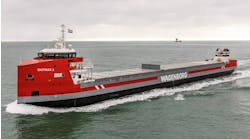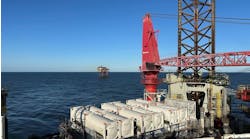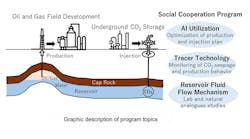Alliance offers comprehensive project service to hard-pressed CO2 emitters
Offshore staff
PARIS, France — DORIS is leading the new CCS Hub Alliance, in partnership with Axens, AWT International, Sea-Quester Offshore and Surbana Jurong Infrastructure.
The main goal is to develop cost-effective, reliable and lower-risk decarbonization solutions for hard-to-abate CO2 emitters, with growing numbers of countries moving toward imposing penalties on industries in this category.
They are proposing a full carbon capture and disposal supply chain, known as the CCS Hub Concept, which would provide:
- Onshore post-combustion CO2 capture and conditioning from hard-to-abate emitters;
- Onshore CO2 transportation to port storage, export terminal and offloading facilities;
- Marine CO2 storage and transport via a floating pipeline development, opening up a broader range of disposal options; and
- CO2 injection into subsurface reservoirs with the capabilities to screen offshore and onshore disposal options and assess repurposing of production infrastructure.
The CCS Hub Concept is designed to be re-scaled and optimized to suit any project in any region, with fast-track delivery of conceptual engineering, infrastructure costs and development plans.
DORIS’ scope would cover overall system integration and the onshore CO2 transport, storage and export facilities, incorporating the company’s gas process engineering and CO2 modeling capabilities for the design of safe CCS facilities.
Axens would have responsibility for CO2 capture and conditioning, contributing its DMX technology, which employs a de-mixing solvent to help reduce the energy intensity involved in CO2 extraction.
Sea-Quester Offshore would provide floating storage and injection via its Carbon Harvester/Pivotree “floating pipeline” system, the concept for which is in the final stages of approval. The development targets low-cost, high-volume sequestration for deployment within 18 months of FID.
AWT International would perform CO2 sequestration reservoir analysis and injection well design. The company has been performing subsurface and well engineering studies as well as drilling project management services and contracting for more than 27 years.
Surbana Jurong Infrastructure would design the onshore infrastructure to support the collection and transport of CO2 from emitters in industrial areas to bunkering and terminal facilities at ports, ahead of export to disposal sites.
Antony Loane, DORIS’ business development manager for Asia-Pacific, said, “We have observed that current CCS technologies are not economical at the large scale needed for regions such as southeast Asia, and this has inspired the CCS Hub Alliance to innovate and develop a cost-effective, reduced-risk decarbonization system suitable for heavy emitters, with a technology development timeline set for 2030 CO2 disposal date."
11.28.2023



